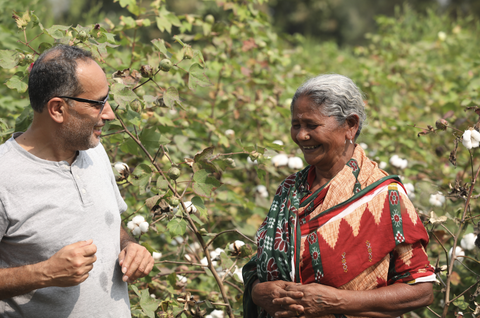Table of Contents
Today, conventional cotton still dominates our surroundings, being found in almost all lifestyle products, including clothes, bedding, hygiene products, etc.
Conventional cotton farming occupies only 2.4% of the planet's cropland in over 65 countries, but because it is a chemical-intensive crop, it accounts for 4.7% of pesticide use (10% sales), and 16% of insecticides globally. Moreover, the waste generated during cotton manufacturing is disposed of in our water supply contaminating freshwater resources used by both humans and wildlife.
Cotton farming employs about 30 million farmers, mostly in developing nations. Aside from the exposure to harmful chemicals, the erratic expenses of growing conventional cotton due to the unpredictability of input prices and the constant risk of crop failure put the farmers in an endless cycle of debt. According to the Bureau of International Labor Affairs, between 400,000 and 450,000 children are forced to engage in the sourcing and production of cotton. These are just a few examples of the negative societal and cultural impacts of conventional cotton farming.
The environmental impacts are a whole different story:
Negative Impacts of Conventional Cotton
The environmental risks associated with traditional cotton cultivation practices have worsened over the years. One of the most often utilized chemicals by cotton producers is aldicarb— a toxic pesticide tagged as extremely hazardous and banned in 125 countries. Conventional cotton growing destroys the topsoil because it compromises the quantity of organic content, dwarfing the water retention capacity. The risk of erosion increases due to the weak topsoil layer, resulting in a decrease of overall soil production. The irrigation systems that divert excessive amounts of surface and groundwater also disrupt the natural water cycle. Meanwhile, the runoff of the toxic pesticides contaminates the water quality in the surrounding regions.
The Agricultural sector dominates in the use of toxic fertilizers, insecticides, manures, etc. Unfortunately, with pests' heightening tolerance to pesticides, the creation of even more dangerous pesticides continues. The potency of pesticides affects pollinators, impacting not only the balance in biodiversity, but also crop yields.
The Better Alternative: Organic Cotton
Organic cotton has several benefits over conventional cotton. It preserves soil fertility and reduces soil erosion. The farming system also does not use synthetic pesticides and fertilizers which are harmful not just to the environment but to farmers' health, workers' health, water, and the ecosystem as a whole.
We can make a difference by shopping prudently— trusting certified organic cotton and certified organic products. Your purchasing habits are the beginning of how we can change the world. Supporting brands that offer organic products will encourage more brands to follow suit, which will also help farmers transition to organic cotton and eventually contribute to the boom of the organic cotton market!
Terra Thread is proud to be a sustainable brand offering products made of certified organic cotton. All of our products are:
- Made with certified organic and fairtrade cotton
- Made in Fair Trade Certified™ factories
- GOTS Certified
And in Jan 2023, we launched our first Regenerative Organic Certified® apparel. Our Regenerative Organic Certified® cotton apparel collection consists of t-shirts, and hoodies.
Related blog:







